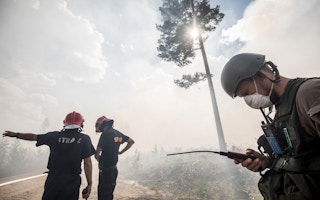With prolonged drought and rising temperatures exacerbating events like the recent wildfires in California, British Columbia, Greece and the Arctic, the days of believing the effects of climate change are only to be felt in the future or in far-flung corners of the world are over.
The climate crisis is here, already impacting every part of the globe and causing irreparable damage to communities. North Americans and Europeans may only be starting to feel these impacts personally, but the farmers ActionAid works with in places like Bangladesh, Senegal, Gambia and India have been struggling with increasing impacts for years, undermining their crop productions and their ability to feed their families.
Developing countries continue to be disproportionately affected by property damage, displacement and loss of life from climate change impacts, even though they have done the least to create this crisis. This month’s epic floods in Kerala, India, caused by unprecedented levels of monsoon rain, left hundreds dead and forced more than one million people to seek refuge in camps and served as a stark reminder of the stakes.
Impacts at even this level of warming should highlight the urgency of avoiding catastrophic climate change, but the world is running out of time to stop the worst of the climate impacts. A leaked draft of the Intergovernmental Panel on Climate Change (IPCC)’s report on 1.5 degree Celsius goal makes it clear that countries’ current commitments still leave the world heading for more (possibly much more) than 3 degrees Celsius of average warming.
The impacts of such a huge heating effect on the planet’s atmosphere and oceans will be nothing less than catastrophic for us all. The IPCC underlines that much more “rapid and far-reaching” action than governments are currently committing to will be needed to meet the goals of the Paris Agreement. We must therefore demand that governments not only complete the rulebook for the Paris Agreement by the end of this year, but also increase climate action on the ground, so that the agreement can deliver on its goals.
Paris Agreement “rulebook”
The immediate task for countries is to agree on the guidelines for implementing the Paris Agreement, because as with any legal document, the small print really matters. For all our sakes, we need the so-called “rulebook” for the Paris Agreement to make sure that those with the most responsibility for causing climate change do their fair share.
As governments meet for UN climate negotiations in Bangkok this week to knuckle down on the task at hand, there will inevitably be some attempts by countries to open loopholes and wriggle out of their responsibilities. ActionAid is in Bangkok alongside our civil society allies working for climate justice to scrutinise the small print and keep pushing for a rulebook that can help the world deliver on the promise of Paris. That also means ensuring that human rights, food security, land rights, biodiversity and gender equality are protected when countries undertake climate action. And we need to make sure that there is real money to deliver action and protect the vulnerable.
To reach the 1.5 degree Celsius goal we also need countries to increase their ambition, since right now the promised level of climate action leaves the world headed for an unimaginable 3 degrees of warming. To unlock the needed ambition, we must demand each country undertake its fair share of action – based on both their share of the responsibility for the crisis and their capacity to act – if the planet is to meet its collective climate goals. No exceptions.
Finance is key
This does mean that developed countries, in particular, need to do more. Developed countries are responsible for producing over 70 per cent of the greenhouse gas emissions that have accumulated in our planet’s atmosphere – even though they only make up a small proportion of the world’s population.
“
To unlock the needed ambition, we must demand each country undertake its fair share of action – based on both their share of the responsibility for the crisis and their capacity to act – if the planet is to meet its collective climate goals. No exceptions.
Meanwhile, poorer countries, the ones that have done the least to cause the climate problem, suffer the most frequent and severe climate impacts.
Their poverty also leaves them least able to cope. Scaling up climate action for developed countries then does not just include mitigation at home, but also climate financing, so that less wealthy countries can do more and protect themselves from the impacts.
The issue of finance underpins so many different parts of climate negotiations. Developing countries have done the least to cause the climate problem, and yet they bear the brunt of its impacts. Not only do they have to pick up the pieces after every disaster, and need to invest in becoming resilient, but they are also expected to join in a global transformation to greener pathways. Without financial support, it will simply not be possible to deliver on the promise of Paris.
The Paris Agreements goals are still achievable, but time is short. We need a strong rulebook to implement the Paris Agreement and for governments to do their fair share of climate action to limit warming to 1.5 degrees.
If everyone does their fair share now, we still have a chance to build a better future together.
Adriano Campolina is chief executive of ActionAid International. This story was published with permission from Thomson Reuters Foundation, the charitable arm of Thomson Reuters, that covers humanitarian news, women’s rights, corruption and climate change. Visit news.trust.org.


















